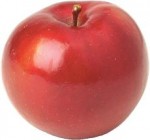It takes more than an apple

When it comes to eating healthy, students shouldn’t look to celebrities or late-night infomercials for guidelines. According to USF Senior Dietitian Kim May, the best role models are those still in diapers.
“When babies are hungry, they drink their bottle,” she said. “When they’re full, they stop drinking. They don’t look at their bottle and decide how many ounces they’re going to drink beforehand. Nor do they continue drinking and drinking when they’re physically full. That’s the key: listening to your body.”
This technique, which May calls “intuitive eating,” may sound simple, but it can be hard to practice – especially with the stress of exams and final term papers. It can be all too tempting to snack away worries, or rationalize that second scoop of ice cream as payoff for countless hours spent studying.
It seems fitting that April is Emotional Overeating Awareness Month, since the “freshman 15″ can be hardest to prevent during those few weeks before final exams.”Millions of people overeat in an attempt to numb unpleasant feelings with food,” Dr. Denise Lamothe, motivational speaker and author of The Taming of the Chew, said on her Web site. “The challenge this month is to experience your feelings without anesthetizing yourself with sugars and simple carbohydrates.”
For many students, those unpleasant feelings could manifest themselves in the three-inch-thick organic chemistry book they have yet to open the night before an exam, or the
12-page paper that’s due in hours but so far only contains the words, “title goes here.” That’s why May encourages students to listen to their bodies before reaching for the Cheetos.
Making a conscious effort not to overeat isn’t the only problem, however. Though the 2006 National College Health Assessment found that 59 percent of students exercise to lose weight, students should remember that what they eat is just as important as how much they consume and how often they hit the gym.
“Even if you work out constantly, if you have bad nutrition, you’re not going to lose weight,” said Bobby Griffith, fitness staff member at the USF Recreation Center. “When creating an exercise program for someone, I first find out about a person’s dietary habits. Then, I would personally put them on a cardio program where they do cardiovascular activity three to four times per week.”
Cardiovascular exercise burns fat faster than other workouts, making it the ideal regiment for anyone looking to lose weight. For example, 30 minutes of step aerobics burns 400 calories, according to ShapeFit.com. Even brisk walking can burn 180 calories within half an hour.
Although it may seem challenging to make time to work out, the trick is to schedule it in as though it’s a class.
“If that involves waking up 30 minutes earlier or going to bed 30 minutes later, you can always make time to work out. You just have to set a time and stick to it,” Griffith said.
Between working, volunteering, studying and attending class, it can be difficult to make time to eat healthy. One myth that May often runs into while counseling students is that eating late at night causes all of the food consumed to be stored in the body as fat.
“The problem that occurs when eating late at night is not that (students are) eating too late at night, but that they’re not hungry,” said May. “If you eat more food than you need, regardless of the time of day it is, it will be stored as body fat.”
Though late-night eating is perfectly OK if you’re hungry, that doesn’t mean you should pencil in time to eat toward the end of the day when your schedule’s open. Going long periods of time without food can cause overeating, which also causes the body to store excess calories as fat.
“Make sure that you have access to something to eat every three to four hours,” May said. “If a person doesn’t eat, what can happen is their hunger can go away for a little while, but then it comes back much stronger. It’s much more likely a person will take in too many calories.”
Apples, bananas with peanut butter, yogurt, trail mix and cottage cheese with fresh fruit are all examples of healthy snacks to eat. May encourages eating fruits and vegetables because they’re rich in fiber, which helps people feel satiated longer.
For on-the-go college students, having access to healthy foods throughout the day can be just as difficult as avoiding overeating. This obstacle can be avoided, however, by proper meal planning.
“It’s natural to eat whatever’s available when you’re hungry. Planning to have something nutritious with you to eat later on is about 90 percent of eating healthfully,” May said.
For free nutrition counseling or additional information on staying in shape, contact USF Student Health Services at (813) 974-2331.







